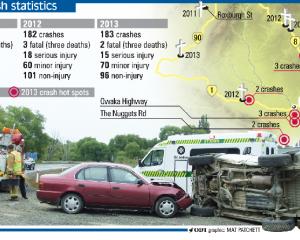People injured in car accidents should be tested for the presence of alcohol in their blood before receiving treatment, Otago Southland Coroner David Crerar says.
He has asked the Southern District Health Board to institute a protocol requiring, where possible, that a blood sample be taken from patients involved in car accidents as soon as they are admitted to hospital.
Mr Crerar made the recommendation in his written findings on the deaths of Scott Ridley, of Oamaru, and Anthony Lyn Smith, of Christchurch, who died after their vehicles collided last March, just south of Maheno.
"Research into the causes of the death and the circumstances of death of Scott Ridley would have been assisted by an 'on-admission' testing for a blood-alcohol concentration."
He had understood that such testing was routine but had since learnt that it was not and the blood samples taken for toxicology tests in Mr Ridley's case did not show any alcohol, even though friends confirmed he had been drinking beer after a dinner out in Dunedin.
"The ability of ESR to complete an accurate toxicological analysis of the blood of Scott Ridley was compromised by the care he received post crash, both in the transfer to Dunedin Hospital and in the hospital."
He found the most likely cause of the accident was Mr Ridley going to sleep and did not believe he was so intoxicated it was an offence for him to be driving.
Southern District Health Board acting chief executive Lexie O'Shea said the board was considering the coroner's recommendations and would discuss the recommendations with, among others, senior clinicians.
"This is a complex issue and there are a number of ethical and national policy issues which need to be considered."
At present, the board would take a sample from a driver, in the circumstances outlined by the coroner, when requested by the police and as required by the Land Transport Act 1998.



